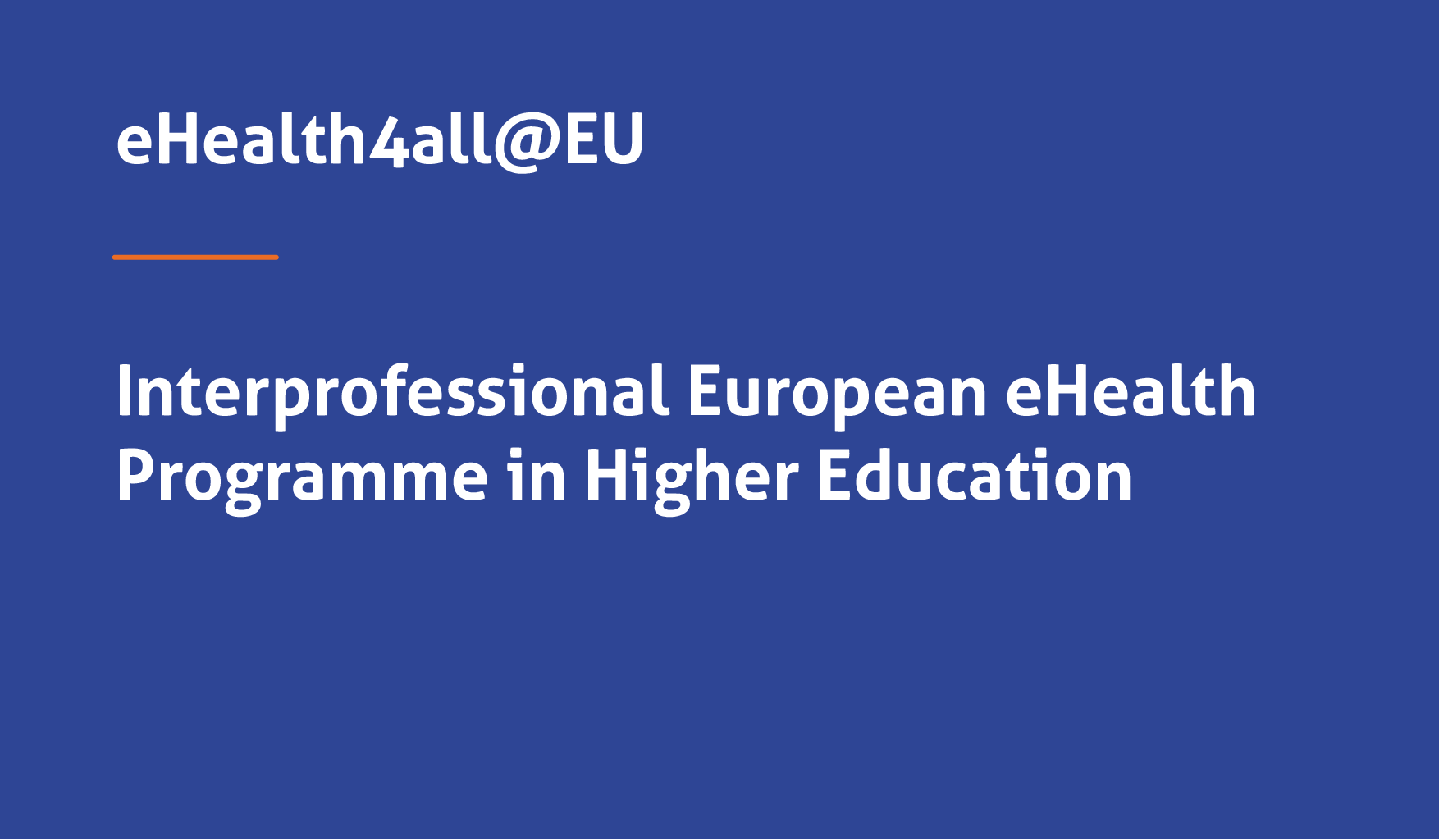Project Description
eHealth4all@EU
eHealth4all@EU – Interprofessional European eHealth Programme in Higher Education
Abstract
eHealth is a priority for European member states as technology can encourage preventative health, help citizens manage their health and social care needs and reduce the cost and utilisation of healthcare. While progress has been made, a number of barriers exist. There is a lack of awareness, understanding and confidence regarding technology amongst some health and other professionals. Better interdisciplinary education in eHealth would address these issues. Both the European Commission and World Health Organization have highlighted the importance of interprofessional education to prepare graduates and upskill the health and care workforce in Europe to facilitate collaborative practice.
The Interprofessional European eHealth Programme in Higher Education (eHealth4all@EU) project will address the high demand for health professionals to be competent and confident in eHealth. This collaborative, multidisciplinary, pan-European project aims to develop, implement and evaluate an interprofessional eHealth training programme for graduate students – the next generation of professionals – in higher education.
Graduate students from many disciplines such as medicine, nursing, allied health, informatics, engineering, business, law, and management will participate in the eHealth4all@EU project. Up to 250 graduate students (Masters and PhD) across four European health systems, in Germany, the United Kingdom (Scotland), Finland and Portugal, will receive high quality interprofessional eHealth training via three E-learning/B-learning courses (covering interoperability, data protection and security, data analytics and big data) and two European Summer Schools (covering innovation & entrepreneurship, leadership and governance, ethical and legal issues). On completion of the project, the eHealth4all@EU programme will be embedded in the participating universities in Germany, Scotland (UK), Finland and the Portugal enabling thousands of students to be educated in this important area long-term. The novel problem-based learning and digitally supported curricula will be freely available.
In order to be able to provide the three courses and the two summer schools, the first five intellectual outputs lay the ground for these educational activities: O1, European eHealth Education: Policy and Practice Review will capture the local needs via focus groups and tailor global international recommendations accordingly. O2: European eHealth Education Pedagogical Methods Complication will define methods in particular problem-based learning scenarios in combination with digital media and tools. Using the lessons learned from these two pieces of work, O3 eHealth4all@EU Curricular Framework will translate O1 and O2 into a curricular framework with learning outcomes, the syllabus, material to be searched, compiled and decided upon and finally assessment procedures to be determined for both the E-learning/B-learning courses and European Summer School. In the next phase, all partner universities will collaborate to design three interactive E-learning/B-learning
courses (O4) building upon O1 to O3. They will cover the key eHealth topics; 1) Interoperability, 2) Data Protection and Data Security, and 3) Big Data and Analytics. A TeacherBot and virtual reality environments will be adapted and integrated into the E-learning platform to engage students and explore cultural competencies in interprofessional care using eHealth. The course material is designed to be applied in videoconferencing supported teamwork across countries. In O5 European Summer Schools on Interprofessional eHealth Education will cooperate to develop material for the face-to-face summer school where three additional key subjects will be taught and assessed; 1) Innovation and Entrepreneurship, 2) Leadership and Governance and 3) Ethics and Legal. Local and independent evaluations will be designed and performed in O6 eHealth4all@EU Evaluations to obtain feedback from the graduate students and teachers who take part in and deliver both the E- learning courses and Summer Schools. O7 eHealth4all@EU Final Report will summarise all activities within the project and lay the ground for a scientific publication in a high impact journal.
The eHealth4all@EU project will take care that its activities have impact beyond the three courses and the two summer schools: There are two international multiplier events in Brussels and Porto and four local multiplier events at the four sites of the partners in Europe. The consortium partners will be present at major scientific conferences, e.g. MIE and MEDINFO, to present work in progress and the final results. All project partners are well interconnected in the scientific and professional community and will make use of these contacts to spread information about the achievements. The eHealth4all@EU project builds upon substantial experience in eHealth education at the four site and will move this experience to the next level for a wide audience.
Funding Institution
Erasmus – Deutschen National Agency – Akademischen Austauschdienst (NA-DAAD)
Montante global
358,982.00 €
CINTESIS Budget
62,423.00 €
Referência
2019-1-DE01-KA203-005040
Duration
01/09/2019 – 31/08/2022
CINTESIS Researchers Involved
Ricardo Correia (local project lead); Paulino de Sousa (deputy project lead); Alexandrina Cardoso; Pedro Marques

